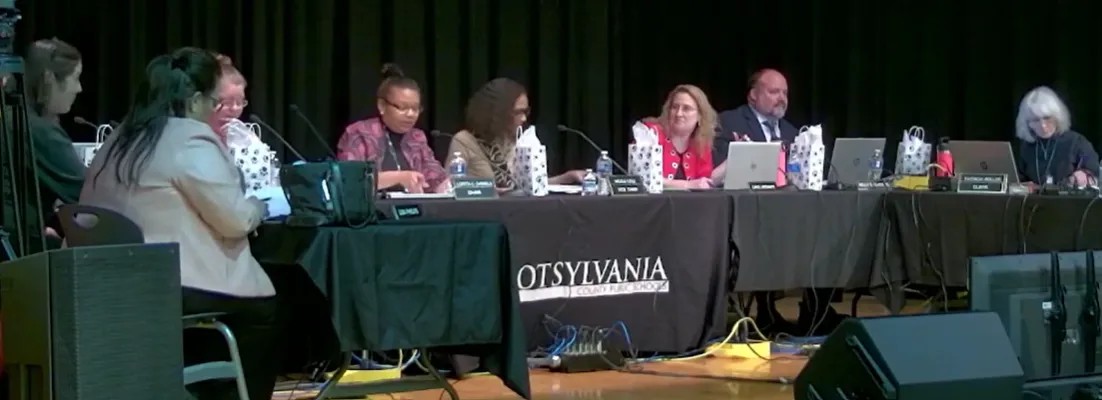
The voters opted for change in Spotsylvania – we’re still a long way from it.
By Martin Davis
EDITOR-IN-CHIEF
The election in November was a referendum on Board chaos. Tossed out of power were two of the four Board members who made up the majority voting bloc and supported burning books—Kirk Twigg (who lost by a 2-1 margin) and Rabih Abuismail (who chose not to run again). Open seats were filled by a political independent and educator (Belen Rodas) and another long-time public-school educator (Carol Medawar).
With Lorita Daniels holding her seat, decidedly pro-public-school members hold a 5-2 advantage. And key to their election victories was a promise to restore order and calm to the Board.
If last night’s Board meeting was any indication, however, we’re a long way from realizing calm anytime soon.
Turbulent Seas, Novice Pilot
April Gillespie and Lisa Phelps, unsurprising to those who watched their behavior the previous two years, are roiling the seas for the new leadership. Since the passing of the gavel, they’ve prolonged votes, belabored points, and left meetings early. Monday night, true to form, they walked out of a closed session meeting. Then needlessly prolonged what should have been a simple procedural vote.
Once the full Board returned to open session, Gillespie and Phelps forced an unnecessarily long discussion about voting to certify the closed session. Not satisfied to stop there, the two followed that up with a needlessly contentious discussion over pulling items from the consent agenda.
All totaled, what should have been a few relatively simple procedural votes became an almost-half-hour argument among Board members.
If Phelps especially was intentionally disruptive, however, it’s also true that Daniels is struggling to maintain control of the meetings.
She is new in the role of chair, so some grace is to be extended, but she is struggling with understanding Roberts Rules of Order, leans too heavily on her vice-chair for guidance, and has a difficult time handling contentious discussions in a firm, but even-handed manner.
Her lack of ability to control the meeting extends to managing members of the public.
The first speaker last night was an individual advocating for the students at John J. Wright and asking for resources to help maintain the building. At the prescribed three-minute mark, she was told her time was up. Saying she needed 30 seconds to wrap up, the chair agreed to let her proceed, after which she spoke for nearly four more minutes.
All in all, it’s a relatively minor misstep. People have the right to speak, but consistent application of rules is important that everyone has an equal opportunity. And when a school board has been as dysfunctional for as long as this one, it’s an easy way to show that you’re serious about restoring order.
Theatre of the Absurd
Perhaps not surprisingly, things went quickly downhill in public comments after the first speaker. Notable were the ad hominem attacks and threats leveled at Board members, both named and unnamed.
One speaker on Monday directly called out Gillespie and Phelps, then lectured them like so many three-year-olds. Yet, the chair allowed this blatant ad hominem attack to proceed unabated.
In another case, a speaker addressed themselves to that night’s Board process and called out members, though not by name, for their actions. To those present, it was clear that the targets, again, were Gillespie and Phelps.
It didn’t stop there. A grown man dressed in swim gear went on a conspiratorial rant that Oliver Stone would have marveled at. Though practically nothing spoken had anything to do with the school system, the chair allowed the rant to continue.
Another speaker went after another unnamed Board member, presumably Medawar, accusing her – incorrectly – of living outside the county and then intimidating the member by talk of private eyes and tailing them.
And still, the chair sat idly by and said nothing.
Gaining Control
In all the aforementioned cases, whether the speakers’ comments are right or wrong regarding their statements is secondary to the issue of appropriateness. No Board member should have to sit through ad hominem attacks and insults.
It is perfectly within the right of the Board chair to insist that members of the public refrain from such disparaging comments. (For a model of guidelines that conform to Roberts Rules of Order and appropriately define proper behavior, see this write-up of how the Village of Kenilworth in Illinois handles public comments.)
The concern about where this school Board is headed, however, does not stop with the actions of the chair and the Board members.
It also falls on the shoulders of those who spoke loudly in November about their dissatisfaction with the chaos that has defined – and derailed – this school system.
The previous Board is in the rearview mirror – firmly where voters said that it belongs. At what point will this community stop talking about what the old Board did, and start talking about the many challenges facing the district in moving ahead?
Let’s be clear – I am not advocating limiting speech in order to gain control. Quite the opposite.
People continue to come to the Board meeting dressed like an amateur vacationing snorkeler and ramble for three minutes, as happened last night, or level ad hominem attacks, because too few people are showing up to offer constructive advice about how to move forward.
Democracy, as the saying go, is a verb. Voters acted in November, but their role is not over. Let them come before the Board to express their concerns, their issues, and their ideas for a better school system.
Such talk was not totally absent on Monday night.
The most important comment last night may well have been from the individual who talked about bus drivers’ inability to use the restrooms in the schools they serve because they don’t have access to the buildings.
It’s a relatively small issue in the grand scheme of things that can be easily addressed. But considerably more children’s daily lives will be made a little better because of this one suggestion than will be improved by the nastiness we’ve too long had to put up with.
This is why public comments exist. To find solutions to problems, large and small, that the public believes should be brought to the table.
This Board needs more of that kind of public comment.
And when more of those who voted for change in November begin speaking out during public comments with ideas for change and insights into the issues before the Board, those holding court in the theatre of the absurd will find a new arena to air their frustrations.
It’s time the public arena be taken back, and made constructive again, by those whose first concern is rebuilding a school system that has been badly damaged.





